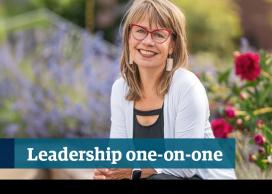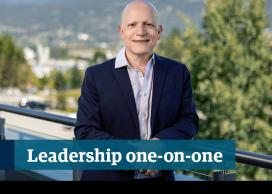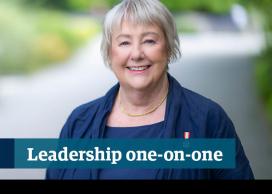Rick Hart is the Associate Vice-President, Communications at UBC. In this role, he is responsible for leading an overarching long-term communications strategy, ensuring alignment with the university’s vision, purpose and values. As a key part of the External Relations leadership team, Rick oversees the Communications portfolio, which is comprised of Brand and Marketing, Internal Communications and Media Relations.
A Sauder School of Business graduate, Rick has held senior positions at global communications agencies in Canada and the UK, before joining UBC in 2013. Since then, Rick has been involved in a number of key initiatives, such as the recent “The Potential is Yours” brand marketing campaign, the launch of UBC Connects, the modernization of UBC’s brand identity and the launch of the UBC Strategic Plan: Shaping UBC’s Next Century.
Q1. What quality do you most admire in a leader?
RH: Authenticity is key. I admire a leader who acts in a way that reflects who they truly are, not an imitation of what others think they should be. If it feels forced and you’re playing a role, then people do not get the benefit of your leadership.
Q2. What makes you laugh?
RH: People who take themselves too seriously to laugh at themselves. As you get more experienced, you realize how many people put masks on to not share what they are really thinking — and part of that is taking yourself too seriously. Take the work seriously, but not yourself.
Q3. Who inspires you, and why?
RH: We’re incredibly fortunate to work at a university, where many inspiring things happen all the time. If I had to pick one group, I would say our faculty. There are so many great researchers, creating and sharing new knowledge, shaping the minds of the leaders of tomorrow. The intellect, dedication and tenacity required to create and share knowledge is immense and inspiring. Having worked in other sectors, you just don’t get the same connection to world-changing ideas and actions that will shape our future – we’re very lucky. I never take that for granted.
Q4. For you, what makes UBC different?
RH: Three things: 1) Our ability to attract top faculty and students, ones that will help change the world, 2) the breadth of the university’s excellence across so many disciplines, and 3) our location in BC, Canada — a largely welcoming and stable environment with lots of opportunity. It’s really the combination of these three things that makes UBC unique.
Q5. What is the most important lesson you’ve learned, in your career to date?
RH: An early boss and mentor once told me: “If you don’t have a contingency, you don’t have a plan.” That’s something I try to live by and apply to all the work we do in communications. We’re in an environment where things shift – budgets change, timelines change – and you have to plan to be flexible. I think that good people in communications and marketing always know there is another idea. So, if you don’t have a contingency, then you don’t really have a plan. You’ve just got wishful thinking. I love that saying and I like the thinking behind it.
Q6. How do you like to recharge?
RH: Mostly creative things, like making music, and physical things, like gardening and working on our 106 year old house. I’m largely self-taught on the guitar and keyboard, and I play in a rock band. I keep a micro synthesizer next to my desk, so whenever I need a break, I roll over and press a few keys. I also like to do some good old-fashioned physical labour, where you can empty your mind.
Q7. What is the best advice you were ever given?
RH: My father was an English professor at UBC, and whenever I was uncertain about whether a particular course or program would be useful or fit my career aspirations, he told me that “no education is ever wasted.” I think that is so true — education always pays off whether it is personally or professionally. As a student, when you are so focused on things you need to take or what’s good for your career, you could miss something that would be eye-opening to you. Some of the best things I took were outside my core requirements. I was always drawn to marketing courses because we had to find creative solutions to real life case studies. I also took a second year oceanography course, which was totally different.
Q8. What do you value in your colleagues?
RH: Collegiality, collaboration and most important, a sense of humour. What we do can be very stressful — we have multiple deadlines, we have quick turnarounds, we often deal with highly emotional or sensitive topics, so it’s really important that our colleagues are collegial. Collaboration is huge, and I don’t think good communication can happen without it. We all put a lot of hours in, and if we’re not having some fun, and having a laugh along the way, it could just become too much.
Q9. What do you hope will be your lasting impact at UBC?
RH: I think “lasting impact” might be a bit strong, but I hope I can play a role moving UBC along in its appreciation of communications and marketing, as activities that play an integral role in the university’s overall success. If I can help move along that appreciation for our community, that would be fantastic.
Q10. If you could have a super power, what would it be?
RH: Time travel. Is that a super power? I would go back in time, way before my life, to see the Renaissance, the Industrial Revolution, the first thing that crawled out of the ooze, or into the future, where I’d like to see a more sustainable, healthy environment for all people.
Q11. What are your priorities for the year ahead?
RH: COVID-19 has had a severe impact on every aspect of the university and Communications is no exception. Throughout these changing times, my priority is to make sure our team continues to have the support and encouragement they need to continue to perform at a high level in a fluid environment. As the situation evolves, we need to continue to be responsive to all the communications needed, internally and externally, providing a rapid communication response on COVID-related topics and issues. At the same time, we need to ensure we are supporting the key strategic priorities of the university.
Q12. How do you think communications can support the academic mission of UBC?
RH: There is a wide range of communications that support the academic mission of the university. Broadly, communications can help share the work of our faculty and researchers to people beyond the university, and beyond academia. Communications plays a role in attracting top students, faculty, staff, donors and partners. Communications also helps faculty and staff have access to the information they need to help them in their work.
Published: October 5, 2020
Interviewed by: Alpha Lam, UBC Internal Communications



